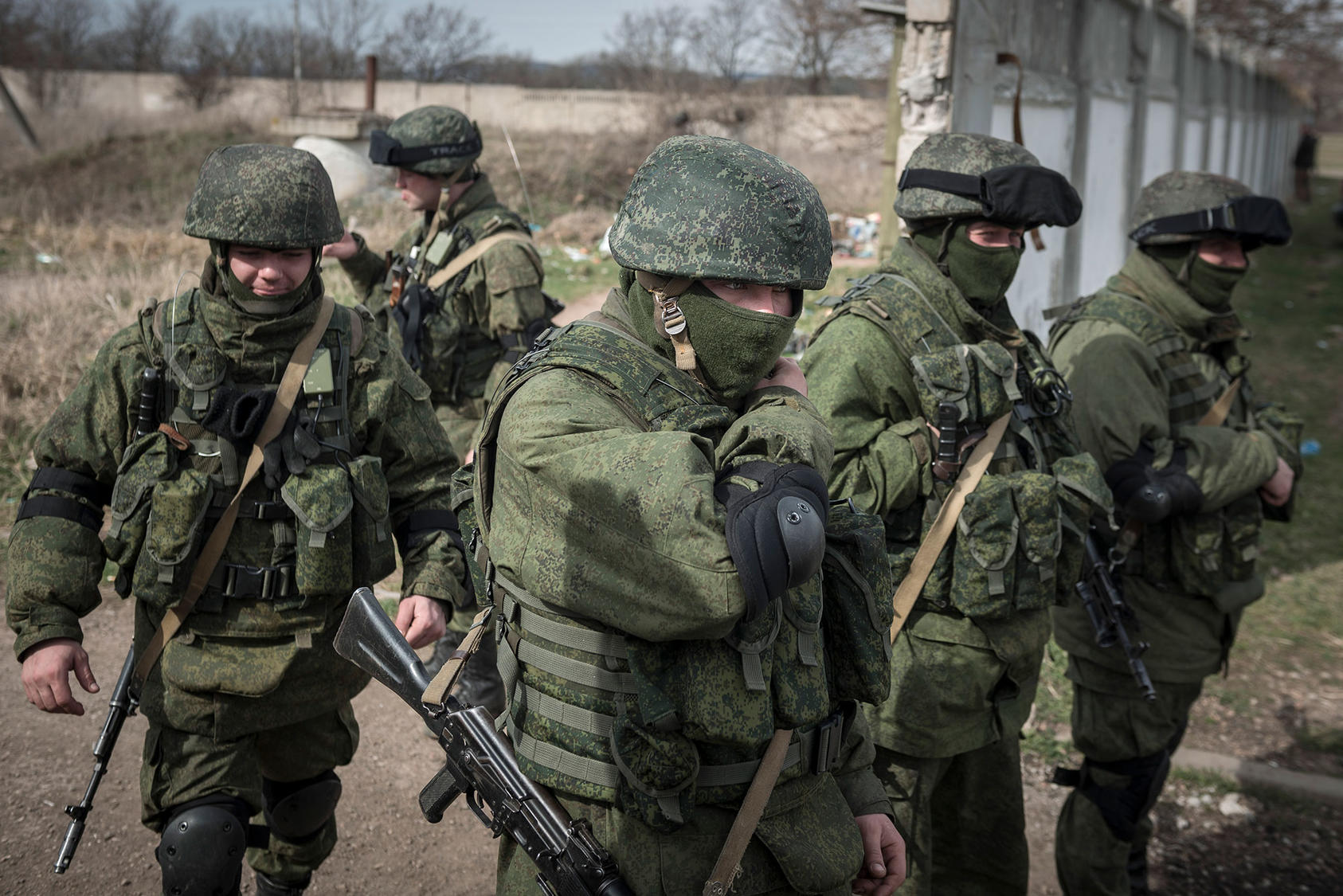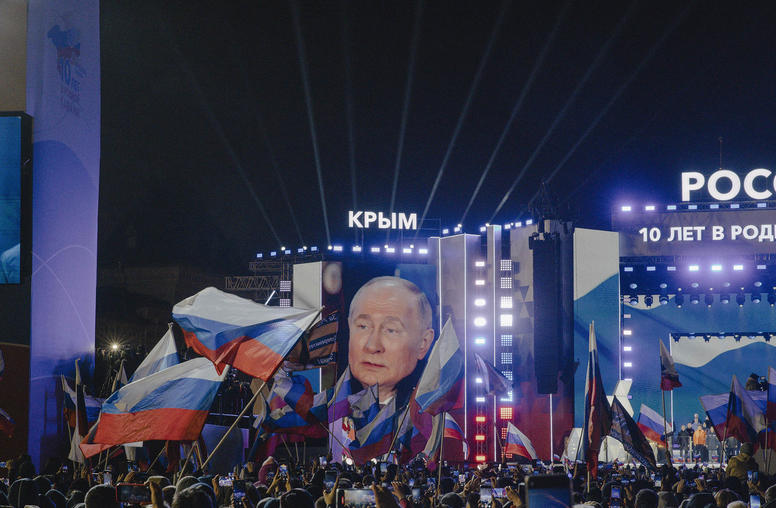It’s Time to Stand Up to Russia’s Aggression in Ukraine
Putin's latest ploy in the Kerch Strait must be countered fast, says Stephen J. Hadley
Five years ago, Russia rolled into Crimea, orchestrated a swift and one-sided referendum, and annexed the Ukrainian territory. The West was blindsided by the attack and slow to provide any response. As a result, Russian President Vladimir Putin launched a second invasion of Ukrainian soil—this one in the country’s east. This attack met stronger resistance, and eventually the West swung into gear to push for a cease-fire and to impose sanctions on Russia. Yet the conflict rumbles on and has killed over 10,300 Ukrainians so far.

Today, the world is facing another challenge. Russia has seized unilateral control of the Kerch Strait, and the West has done nothing. This may tempt Putin—who is already massing forces—to seize even more Ukrainian territory, attempt to subvert the Ukrainian presidential election, or both.
U.S. President Donald Trump is right to say that Putin took Crimea and the West did nothing. But now that Putin may have bigger designs, what will Trump do?
Russia’s Seizure of the Strategic Kerch Strait
On Nov. 25, 2018, Russian Coast Guard vessels fired on Ukrainian naval ships in international waters in the Black Sea, damaging the vessels and wounding a handful of Ukrainian sailors. Russia then took possession of the ships and imprisoned the sailors.
The Ukrainian ships had attempted to pass from Ukraine’s port at Odessa to its port at Mariupol, on the Sea of Azov. Doing so requires transiting the very narrow and shallow Kerch Strait, over which Russia has now built a road and rail bridge connecting Russia with Russian-occupied Crimea. The Ukrainian vessels refused to recognize Russia’s assertion of unilateral control over the strait or to comply with the instructions of the Russian Coast Guard to wait outside the strait. The ships proceeded anyway and were first blocked, then attacked by the Russian Coast Guard.
By firing on the Ukrainian naval ships in international waters, by treating Ukraine’s sailors as civilians rather than members of a sovereign state’s armed forces, and by basing these actions on its claimed annexation of Crimea and its territorial waters, Russia violated international law, the laws of armed conflict, and a 2003 bilateral agreement in which Russia and Ukraine agreed to share sovereignty and control over the Sea of Azov and the Kerch Strait. Russia argues that it now has sole sovereignty over the strait; most of the world disagrees.
Ukraine will not lightly abandon its right to move naval vessels through the Kerch Strait and other territorial waters around Crimea. Russia is likely to respond as aggressively as it did in November, worsening the risk of further conflict. But there are several other factors heightening the crisis.
Ukraine’s Election Looms
Presidential elections will be held in Ukraine on March 31, and Putin is keen to see Ukrainian President Petro Poroshenko weakened and ultimately defeated. Russia is also angered by the Ukrainian Orthodox Church gaining autocephaly—independence from the Russian Orthodox Church—for the first time since 1686. Crimea is dependent on freshwater reservoirs on Ukrainian territory, making them a dangerous temptation for Russia.
Putin’s tactics follow a familiar pattern: identify an opportunity to advance his view of Russian interests, mount a limited military operation to exploit that opportunity, and see whether it provokes any serious international condemnation or military response. If not, up the stakes and expand the operation.
In the nearly two months since Russia attacked the Ukrainian naval vessels, there has been almost no international response.
In the nearly two months since Russia attacked the Ukrainian naval vessels, there has been almost no international response. As a result, Russia may believe it will face little resistance to further attacks on Ukrainian territory or territorial waters, much as it concluded in 2008 prior to attacking Georgia or in 2014 when pivoting from annexing Crimea to attacking the Donbass. But prudent steps taken now could help deter further aggression in the first place.
How to Prevent Escalation
Such measures should cover a wide spectrum of diplomatic, economic, and preventive military steps. On the diplomatic side, European and American leaders should weigh in to condemn past aggression against Ukraine and warn against any further such action.
On the economic side, the European Union and United States should introduce sanctions tied specifically to Russia’s unilateral claim to control the Kerch Straits and access to the Sea of Azov. The United States should also redouble efforts to persuade Germany to defer the Nord Stream 2 gas pipeline project, at least as long as Russia’s aggression against Ukraine continues—or better yet, to cancel it altogether.
On the military side, major European countries and the United States should increase their presence in the Black Sea and conduct regular port visits to Odessa and other Ukrainian ports in the area. International observers should be placed on Ukrainian ships as they transit the Kerch Strait. It would also be prudent to establish an international civilian observer presence in Ukrainian territory north of Crimea, near Mykolaiv, Melitopol, and Berdyansk. The United States and European allies should accelerate and increase planned assistance to Ukraine’s armed forces, with a focus on naval, coastal defense, and air defense capabilities. And the United States and allied countries should work with Turkey to reinforce freedom of navigation activities in the Black Sea.
Russia has dug a hole for itself in the Donbass. The military situation is stalemated, and Russia is under economic sanctions. It may think that attacks elsewhere in Ukraine will break that stalemate. But that would only result in more sanctions and deepen the hole. A better course for Russia would be a graceful exit through a negotiated political resolution that respects those Russian interests that are legitimate but restores the Donbass to Ukraine’s sovereign control.
No such negotiations are likely until after the March Ukrainian presidential election. At that point, negotiations should pick up on suggestions made by both Putin and Poroshenko that an international peacekeeping force be deployed to the Donbass. The peacekeeping force would be accompanied by an interim United Nations administrative authority tasked with preparing for elections in the Donbass and overseeing implementation of political and economic elements of an overall settlement based on the two Minsk agreements. Russia would thus turn over security of Russian-speaking Ukrainians in the Donbass to the international community and withdraw its forces back across the Ukrainian-Russian border, returning the Donbass to Ukrainian sovereignty and control. International sanctions imposed on Russia for its actions in the Donbass would be lifted.
This resolution to the Donbass would still leave Crimea unresolved. But it would be a first step toward getting Russia’s relations with the United States and Europe back into a more manageable framework: cooperating with Russia where they can and standing up for their principles where they and Russia disagree, but managing those disagreements so that they do not lead to confrontation or conflict. A return to such a framework would benefit the interests of everyone, including Russia itself.
This article was originally published in Foreign Policy.


